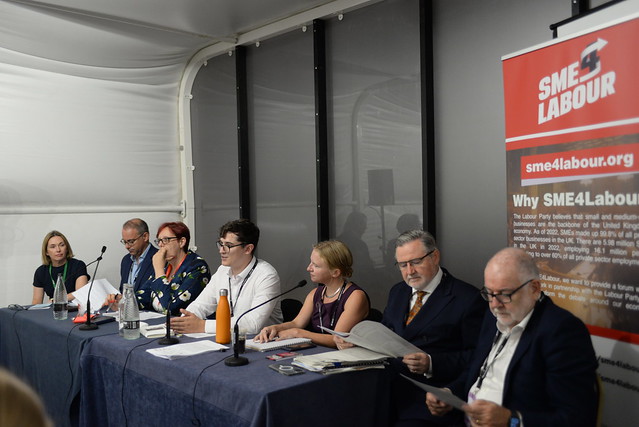The Labour Party Annual Conference 2023
SME4Labour, Labour Campaign for Human Rights and Corporate Justice Coalition fringe: ‘Green prosperity’ and human rights: preventing UK corporate and public sector supply chain abuses
🗓 Date: Monday, 9 October 2023
⏳ Time: 14:00
📍Location: SME4Labour POD (Meeting Room 22), ACC Liverpool, Kings Dock Street, Liverpool, England, L3 4FP
SME4Labour, Labour Campaign for Human Rights and Corporate Justice Coalition fringed: Green Prosperity and Human Rights: Preventing UK Corporate and Public Sector Supply Chain Abuses with Jaselle Williams, conducts UK public affairs on behalf of Tony’s Chocolonely; Dan Leader, Barrister and Partner at Leigh Day International law department; Barry Gardiner MP; Kiera Box, Friends of the Earth and Liz Hind, Women in Business. This panel discussion was chaired by James Jennion, co-director of the Labour Campaign for Human Rights.
Dan Leader emphasized the imperative for substantial legal reforms concerning the operational conduct of businesses. It is essential to establish a comprehensive set of rules governing their practices. Despite the challenges, there is reason for optimism, as global awareness of the severity of the situation has been steadily increasing, leading to legal changes worldwide over the past three years. These legal reforms enable the accountability of British multinationals and their subsidiaries in the global South. Nonetheless, there remains a pressing need for substantial legal transformation. While the UK courts have shown progressiveness, the government has been lagging in this regard. There are three key aspects to address. First, it is essential for UK businesses, consumers, and investors to have confidence in the absence of significant human rights and environmental issues within their supply chains. Second, for companies that violate local laws and international norms, holding them accountable should become a more streamlined process, facilitating remedies for victims of severe human rights and environmental abuses. Finally, the existing legal framework, influenced by Supreme Court decisions, inadvertently incentivizes companies to act contrary to the necessary ethical standards.
Barry Gardiner underscored the imperative of establishing a trade policy framework that centres on justice. He acknowledged the positive strides that the UK has taken in incorporating animal welfare considerations into trade agreements, marking a significant milestone. However, he emphasized the absence of provisions addressing labour abuse and human rights violations in these agreements and highlighted their notable absence in ongoing free trade negotiations. Gardiner articulated the necessity of implementing a progressive trade strategy that aligns seamlessly with the UK’s industrial framework. This strategy should effectively identify the essential pillars of the domestic economy, recognizing the strengths where competitive advantages exist, ultimately facilitating exports and bolstering the economy. Moreover, he underscored the importance of revisiting the economic relationships the UK shares with the global South, advocating for its integration into the broader trade policy agenda.

